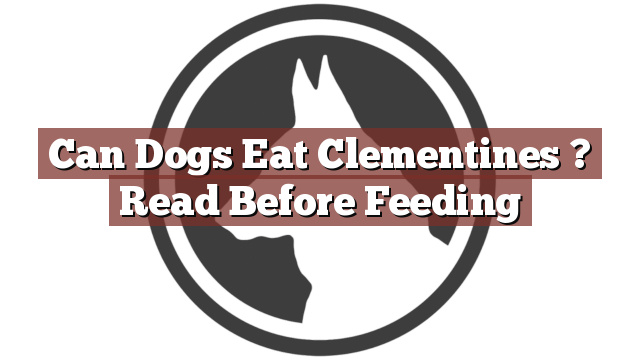Understanding Your Dog’s Dietary Needs
As a responsible pet owner, it is crucial to understand your dog’s dietary needs to ensure their overall health and well-being. While dogs are omnivores and can consume a variety of foods, not everything that is safe for humans is safe for our furry friends. Therefore, it is important to be aware of what foods are suitable for dogs and what should be avoided. This knowledge will help us make informed decisions when it comes to feeding our beloved pets.
Can Dogs Eat Clementines? Read Before Feeding
Can dogs eat clementines? This is a common question that many dog owners might have. Clementines are a type of citrus fruit that is known for its sweet and tangy taste. However, when it comes to feeding clementines to your dog, it is important to exercise caution. While clementines themselves are not toxic to dogs, they should be given in moderation and with certain considerations in mind.
The answer to whether dogs can eat clementines is yes, but with some important caveats. Clementines contain essential vitamins and minerals such as vitamin C, potassium, and fiber, which can provide some health benefits for your dog. However, they also contain a significant amount of sugar and acidity, which can be harmful to your dog’s digestive system if consumed in excess. Therefore, it is important to feed clementines to your dog in moderation and remove any seeds or peel, as they can be a choking hazard or cause digestive issues.
Pros and Cons of Feeding Clementines to Dogs
Feeding clementines to your dog can have both pros and cons. On the positive side, clementines are a good source of vitamin C, which can boost your dog’s immune system and help fight off illnesses. They also contain fiber, which can aid in digestion and promote a healthy digestive tract. Additionally, the natural sweetness of clementines can act as a tasty treat for your furry friend.
However, there are also potential downsides to consider. As mentioned earlier, clementines are high in sugar and acidity, which can lead to upset stomach, diarrhea, or other digestive issues if consumed in excess. The high sugar content can also contribute to weight gain and dental problems in dogs. Furthermore, the presence of seeds or peel can pose a choking hazard or potentially cause blockages in your dog’s digestive system.
Conclusion: Considerations for Feeding Clementines to Your Dog
In conclusion, while dogs can eat clementines, it is important to do so in moderation and with caution. Always remember to remove any seeds or peel before feeding clementines to your dog. It is also important to consider your dog’s individual dietary needs and any existing health conditions. If your dog has any underlying medical conditions such as diabetes or gastrointestinal issues, it may be best to avoid feeding them clementines altogether.
If you choose to introduce clementines into your dog’s diet, start with small portions and monitor their reaction closely. If you notice any adverse effects such as stomach upset or changes in bowel movements, discontinue feeding clementines immediately. As always, it is recommended to consult with your veterinarian before introducing any new foods to your dog’s diet to ensure their safety and well-being.
Thank you for taking the time to read through our exploration of [page_title]. As every dog lover knows, our furry friends have unique dietary needs and responses, often varying from one canine to another. This is why it's paramount to approach any changes in their diet with caution and knowledge.
Before introducing any new treats or making alterations to your dog's diet based on our insights, it's crucial to consult with a veterinarian about [page_title]. Their expertise ensures that the choices you make are well-suited to your particular pet's health and well-being.
Even seemingly harmless foods can sometimes lead to allergic reactions or digestive issues, which is why monitoring your dog after introducing any new food item is essential.
The content provided here on [page_title] is crafted with care, thorough research, and a genuine love for dogs. Nevertheless, it serves as a general guideline and should not be considered a substitute for professional veterinary advice.
Always prioritize the expert insights of your veterinarian, and remember that the health and happiness of your furry companion come first.
May your journey with your pet continue to be filled with joy, love, and safe culinary adventures. Happy reading, and even happier snacking for your canine friend!

